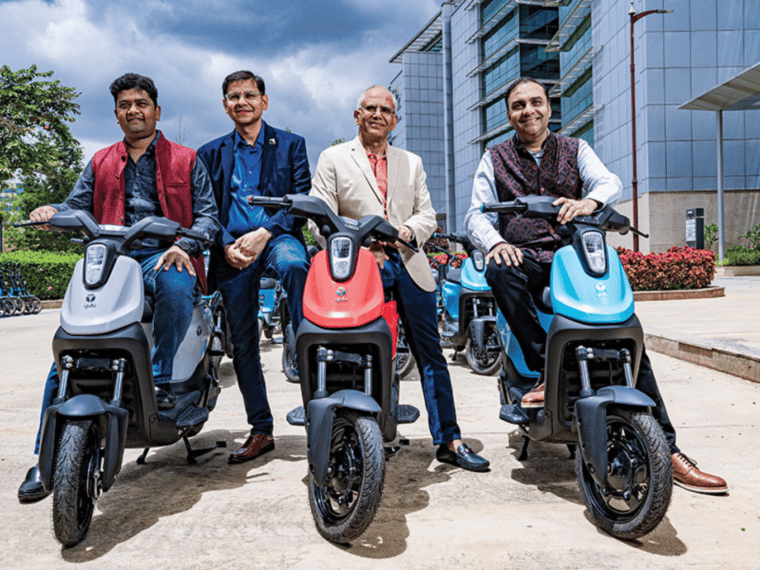Yulu claims to have crossed ARR of $30 Mn and also turned EBITDA positive on the growing demand for quick commerce and food delivery services as well as supportive government policies.
Currently, Yulu has a fleet of over 40,000 electric vehicles and is looking to double down on its plan to deploy one lakh EVs by 2025. To fuel this expansion, it will raise $100 Mn in its Series C funding round over the next year.
In September last year, Yulu raised $82 Mn (INR 653 Cr) in its Series B round of funding, which was led by the US-based Magna International and saw participation from Bajaj Auto.
Electric mobility startup Yulu
Currently, Yulu has a fleet of over 40,000 electric vehicles and is looking to double down on its plan to deploy one lakh EVs by 2025. To fuel this expansion, it will raise $100 Mn (around INR 839.6 Cr) in its Series C funding round over the next year.
Yulu, cofounded by Amit Gupta, RK Misra, Naveen Dachuri and Hemant Gupta in 2017, offers electric-two wheeler mobility solutions in Bengaluru, Delhi NCR, and Mumbai. The startup now plans to expand to cities like Hyderabad, Kolkata, and Chennai.
In September last year, Yulu raised $82 Mn (INR 653 Cr) in its Series B round of funding, which was led by the US-based Magna International and saw participation from Bajaj Auto.
The startup claims to facilitate over 20 Mn deliveries per month, claiming to save 30-40% cost compared with traditional fuel vehicles. The company says that its AI powered platform allows it to scale while maintaining efficiency.
“The simplicity and ease of our platform allow gig workers without vehicles to join the delivery workforce, while also addressing the crucial supply gap in the quick commerce value chain,” said Amit Gupta.
Yulu claims to cover about 100% of all the dark stores. It further says that its EVs comprise 35-80% of all vehicles at the store level and claims to have increased its revenue and users by more than 7X in the last 24 months.
The growth is also supported by its battery-swapping network, Yuma Energy, and partnerships with players in the quick commerce space like Zomato, Zepto, Blinkit, Swiggy, among others.
The company is also eyeing to grow on the back of central and state level policies to boost transport electrification and ecommerce– including government backed Open Network for Digital Commerce (ONDC).
The company’s consolidated net loss widened 71% year-on-year (YoY) to INR 94.9 Cr in the financial year 2022-23 (FY23) as the company’s expenses jumped with the expansion of its battery swapping infra and increasing headcount.
Disclaimer
We strive to uphold the highest ethical standards in all of our reporting and coverage. We StartupNews.fyi want to be transparent with our readers about any potential conflicts of interest that may arise in our work. It’s possible that some of the investors we feature may have connections to other businesses, including competitors or companies we write about. However, we want to assure our readers that this will not have any impact on the integrity or impartiality of our reporting. We are committed to delivering accurate, unbiased news and information to our audience, and we will continue to uphold our ethics and principles in all of our work. Thank you for your trust and support.



![[CITYPNG.COM]White Google Play PlayStore Logo – 1500×1500](https://startupnews.fyi/wp-content/uploads/2025/08/CITYPNG.COMWhite-Google-Play-PlayStore-Logo-1500x1500-1-630x630.png)